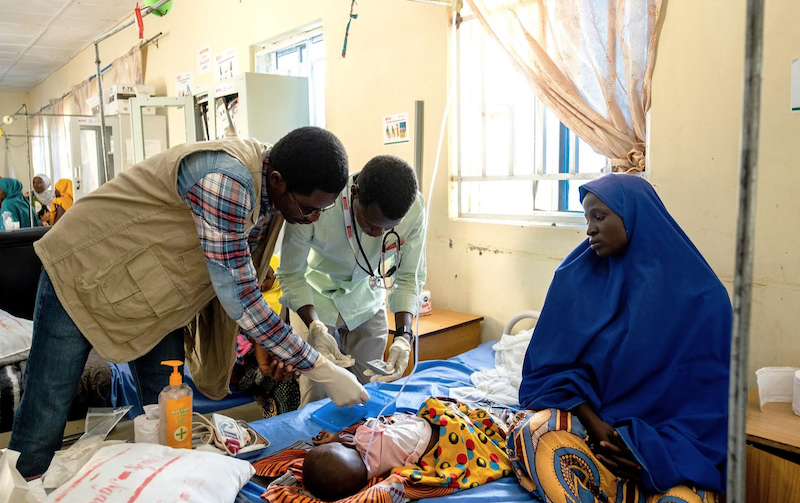By Mohamed Malick Fall
Every year, World Humanitarian Day (WHD) serves as a poignant reminder of the critical importance of humanitarian efforts globally. This year, the theme #ActForHumanity emphasizes the collective responsibility we all share in protecting civilians and the humanitarian workers who serve them in conflicts and other crises.
As we observe this day on 19 August, it is crucial to reflect on the profound implications of ongoing conflicts, the flagrant violations of international humanitarian law (IHL), and the dire need for global leaders to take decisive action and say enough is enough.
Conflicts around the world, from Gaza to Sudan, continue to wreak havoc on civilians. Climate change is also increasing humanitarian needs.
In north-east Nigeria, the prolonged conflict has resulted in a severe humanitarian crisis, displacing millions, disrupting livelihoods and compounding already alarming levels of food insecurity and malnutrition.
In 2024 alone, 8.1 million people need humanitarian assistance in Borno, Adamawa and Yobe (BAY) states in north-east Nigeria. This includes 2.1 million internally displaced persons (IDPs) and 4.1 million people in host communities. Humanitarian partners together with the Government of Nigeria aim to reach 4.4 million of these people with lifesaving food, water, shelter and other emergency assistance.
In Borno State, Anna Monday, a mother of four, endures the harsh realities of displacement. Forced from her home, she now lives in a temporary learning centre at the reception centre in Pulka, a place designed for short-term accommodation but now a long-term refuge for many. Up to 30 women sleep in the shelter while the men sleep outside, highlighting the lack of adequate shelter.
Amina Buba, a mother of four, was displaced from her village in Adamawa State due to violent attacks by insurgent groups. Her home was burnt, forcing her family to flee with only the clothes on their backs. In the IDP camp, Amina struggles to find enough food and clean water for her children.
Fatima Mohammadu, a young girl from Yobe State, was separated from her family during a raid on her village. She was found by humanitarian workers and brought to an IDP camp. The trauma of separation and the loss of her loved ones have left deep emotional scars. In the camp, she faces challenges such as lack of access to education and inadequate nutrition.
Women, men, boys and girls across Nigeria are also affected due to crises linked to intercommunal violence, the climate crisis or general hardships. Women and children, often suffer the worst effects enduring widespread violations of their rights, including sexual violence.
A combination of insecurity, limited access to affected people, and inadequate funding and resources are complicating the delivery of essential services, leaving millions of people in humanitarian need.
In north-east Nigeria, attacks on civilians and humanitarian workers have become disturbingly common blatantly violating international humanitarian law.
On 29 June, for instance, numerous civilians died, and dozens were injured in multiple suicide attacks in Gwoza, Borno. A month later, many families lost their loved ones in yet another suicide attack in Konduga, also in Borno. These incidents underscore the persistent threat to civilian lives in conflict, and highlight the urgent need for enhanced protection measures, including stricter adherence to international norms and the need for greater accountability for violations.
Every day, humanitarian workers, from Government, non-governmental organizations, the United Nations (UN), civil society, Nigerian and international staff go out of their way to save lives and to bring people back to their feet. Host communities accommodate people who are internally displaced despite not having much to share because of their humanity.
World Humanitarian Day is more relevant than ever. The world has never seen greater humanitarian need. The number of people who are suffering because of conflict and other humanitarian crises is staggering. There has never been a more urgent need to protect civilians, and to recognize the critical role of humanitarian workers.
Global leaders and parties to conflict have a pivotal role to play in resolving conflicts and protecting humanitarian workers. They must not only condemn violations of international humanitarian law, but also take concrete steps to hold those responsible for violations accountable.
Thanks to funding from donors, humanitarians are reaching millions of people each year with lifesaving assistance. But they need robust support to continue their vital work in support of Government efforts. This includes financial resources, humanitarian access, and political goodwill. Today, only a quarter of the resources needed to address urgent humanitarian needs globally and in north-east Nigeria has been forthcoming. Without these resources we will be unable to support Anna, Amina, and Fatima to survive and rebuild their lives. Beyond humanitarian interventions, development-related activities are key as humanitarian needs also stem from a lack of basic services, a lack of livelihoods, and poor access to employment for young people.
The theme #ActForHumanity is not just a slogan; it is a call to action. It implores each one of us to stand up for those who cannot stand up for themselves, to speak out against injustices, and to work towards a world where humanitarian principles are respected, and lives are protected.
On this World Humanitarian Day, let us all pledge to act for humanity, for today and for the future.
I trust that you will stand with me in solidarity with people affected by conflict and disaster and the brave men and women who come to their aid. They should not be the target of violence but must be protected at all cost.
Mohamed Malick Fall is the UN Resident and Humanitarian Coordinator in Nigeria.
